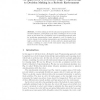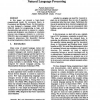529 search results - page 15 / 106 » Simple Random Logic Programs |
238
click to vote
POPL
2003
ACM
16 years 2 months ago
2003
ACM
We present a new polynomial-time randomized algorithm for discovering affine equalities involving variables in a program. The key idea of the algorithm is to execute a code fragme...
105
click to vote
IJCAI
2003
15 years 3 months ago
2003
Disjunctive Logic Programming (DLP) is a very expressive formalism: it allows to express every property of finite structures that is decidable in the complexity class ¡£¢¤ (�...
150
Voted
LPNMR
2007
Springer
15 years 8 months ago
2007
Springer
Decision making models for autonomous agents have received increased attention, particularly in the field of intelligent robots. In this paper we will show how a Defeasible Logic ...
133
click to vote
AAAI
2008
15 years 4 months ago
2008
Logic programming with negation offers a compelling approach to abductive reasoning. This paper shows a simple view of abduction in this context for the completion semantics, unde...
EACL
1989
ACL Anthology
15 years 3 months ago
1989
ACL Anthology
In this paper, we present a logic-based computational model for movement theory in Government and Binding Theory. For that purpose, we have designed a language called DISLOG. DISL...


